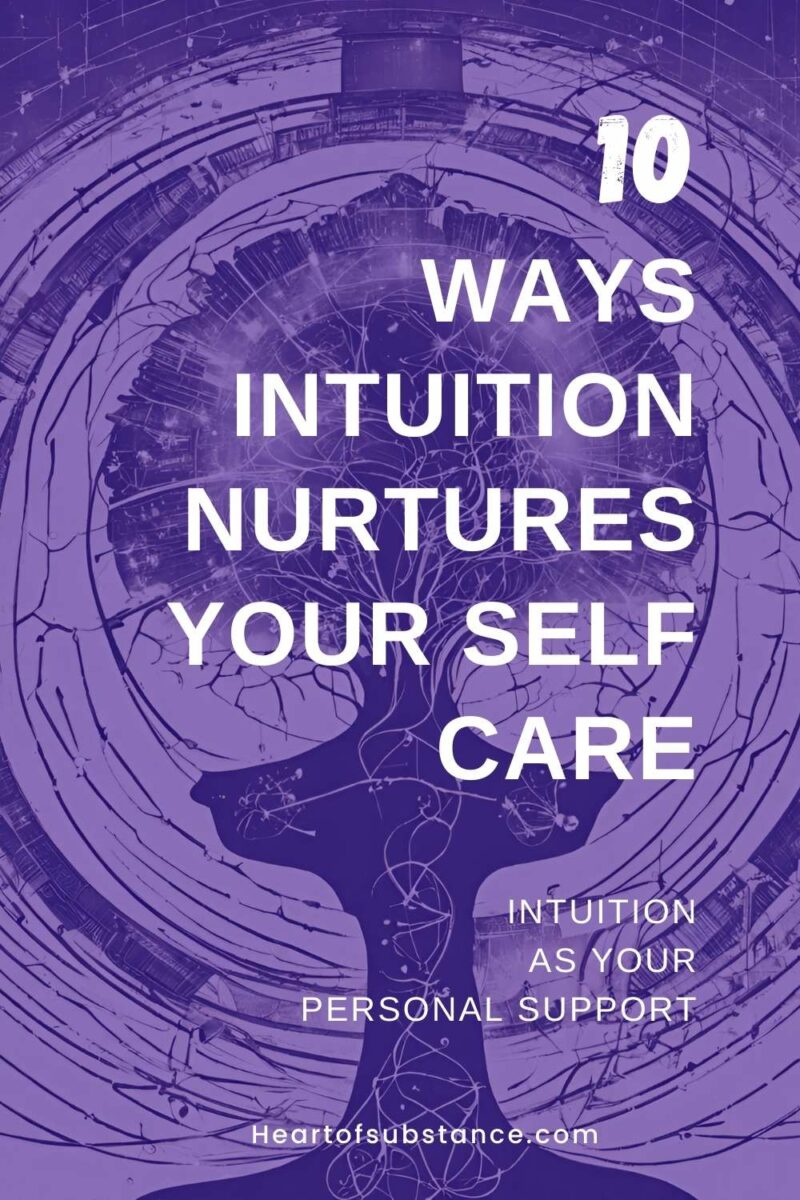My take on intuition is that it’s the inner voice or higher awareness that guides us to the best in life…
How intuition helps with self-care
Intuition helps you know your needs, like… when you need to take a break from work or a relationship that no longer serves you. It also helps you tune in to what your body requires.
Intuition helps you choose paths that align with your true self and values, to make choices that are good for your physical, emotional, and spiritual well-being.
Here are 10 areas where your intuition can benefit your self-care…
When your mind and body needs a break
Listen to your body regarding how much rest it needs. Your intuition can help you determine if you need to take a break, a nap, or sleep.
Here’s an example… Say you’re a student struggling to keep up with your coursework. Despite feeling tired, you push through the night studying without a break leading you to feel exhausted and less focused.
If you had tuned in to your body’s needs you might have realized you needed to take a break or a power nap to freshen your mind for effective output that would help you achieve good grades.
exertion effort
Your intuition can help you find the best type of movement for you. One that feels good for your body and one that you’re likely to stick with.
For example, if you feel pain or discomfort while running, it may be a sign that you’re overdoing it or maybe doing it wrong and you need to follow up on the right foot wear or guidance from a trainer.
Learning to trust your intuition when it comes to movement can help you avoid injuries, prevent burnout, and make exercise more enjoyable. For instance, if you’re feeling tired and sluggish, your intuition might tell you that a gentle yoga class or a walk in nature is what your body needs instead of a high-intensity workout.
By listening to your intuition, you can create a workout routine that is tailored to your unique needs and preferences.
healthy consuming
Pay attention to your cravings and cues. Your intuition can help you make choices that are nourishing and satisfying to your mind, body and soul.
For example, let’s say you’re feeling a sudden craving for something sweet. Instead of automatically reaching for a candy bar or sugary snack, take a moment to consider what your body might really need.
It could be that you’re simply thirsty, or maybe you’re in need of something healthy to give you a sustained energy boost.
So next time you feel a craving coming on, take a deep breath, listen to your intuition, and make a choice that nourishes both your body and your soul.
This is not only about healthy eating habits but can also be about your use of goods and services.
Know your stress threshold
Follow your intuition for stress management.
Your intuition can help you identify your stress triggers and find ways to manage them effectively.
For example, let’s say you have been feeling overwhelmed at work lately and stressed. Your intuition might point to the negative vibes from that particular co-worker constantly criticizing your work.
Once you have identified this trigger, you can take steps to manage your stress by addressing the issue with your co-worker or finding ways to minimize your interactions with them.
You may also be able to find other ways to manage your stress, such as taking breaks throughout the day or practicing mindfulness techniques.
By using your intuition to identify your stress triggers and find effective ways to manage them, you can improve your overall well-being and maintain a healthier, more balanced lifestyle.
If stress signals go unheeded, your gut health and intuition may both suffer, since stress impedes both.
Practice self Compassion
Trust your intuition when it comes to treating yourself with kindness and compassion. It can be easy to get caught up in the expectations and opinions of others. When you listen to your intuition, you are more likely to make decisions that align with your values and needs.
For example, you may be tempted to push through trying to perfect something you’re working on, but your intuition is telling you that you need a break.
Trusting your intuition in this situation would mean taking a step back. Maybe that means taking time away from the activity, going for a walk in nature, or spending time with loved ones. By trusting your intuition and prioritizing your own needs, you’ll be better equipped to handle the challenges that come your way.
set boundaries
Learn to say no to things that don’t align with your values or make you uncomfortable. Trust yourself to know what is best for you.
For example, let’s say you have a friend who always seems to take advantage of your time and resources. You may feel guilty saying no to them, but your intuition is telling you that it’s time to set some boundaries.
It may be useful to practice mindfulness activities to allow space for your intuition to guide you on setting the boundaries that are right for you and that help you navigate difficult situations.
For a deeper dive, see my article on whether your gut feeling is always right in relationships?
Express creativity
Listen to your intuition when it comes to expressing yourself to release emotions, and reduce stress.
You can create something arty or crafty that represents what you feel. This can be incredibly cathartic, as it allows you to release pent-up emotions and reduce stress.
For example, let’s say you’re feeling stressed out about something someone did or said that affects you. You could do something with your hands using colors, words, or notes that intuitively feel right to you.
This meaningful activity can help you process your emotions so you feel more centered and calm. You may be surprised by how much it can help.
Time for self-reflection
Your intuition can guide you toward taking time for self-reflection and introspection. This is especially important in a world that often encourages us to prioritize external validation and success over our own inner voice.
For example, imagine you are considering a job opportunity that seems attractive on paper but doesn’t quite feel right in your gut. By taking time for self-reflection and introspection, you can explore what aspects of the opportunity are causing your intuition to sound the alarm. Maybe you realize that the job would require you to work long hours and sacrifice time with your family – something that goes against your personal values. Armed with this knowledge, you can make a more informed decision about whether or not to accept the job offer.
develop self-awareness
When we are self-aware, we are better equipped to make choices that are in alignment with our values and goals, and we are more likely to prioritize our own well-being.
Trust your intuition when it comes to understanding your own emotions and needs. You can become a better advocate for your own well-being and choices that support your soul.
Allowing space for it can help you identify and understand your emotions.
choose self-care practices best for you
Your intuition can help you create self-care rituals that are tailored to your individual needs and preferences. This means that you’ll be more likely to stick with these rituals and feel the benefits of them over time.
When it comes to taking care of yourself, it’s important to listen to your intuition. Your intuition is the wisdom that comes from within, and it knows your needs better than anyone else.
A self-care ritual can be anything that helps you relax, de-stress, or feel good about yourself. Here are a few ideas:
- Pray or meditate each day. This can help you clear your mind and alleviate stress.
- In your break, go for a walk in nature, on the beach, or spend time in a nearby park or garden. This can be calming and help you feel more grounded.
- Take 5-10 min to write in a journal each day. Writing down your thoughts and feelings can be a great way to process your emotions and reduce stress.
- Incorporate some form of movement, such as yoga, walking, running or similar exercise.
- At night, relax in a warm Epsom salt bath with candlelight and soft music. This can help you relax and soothe your muscles ready for rejuvenating sleep.
Practice making space for intuition
Take time to slow down and be present in the moment. This will help you tune into your body and emotions, making it easier to recognize when something feels off.
It can be helpful to practice mindfulness and self-reflection. This might include journaling, meditation, or simply taking a few moments each day to check in with ourselves and ask how we are feeling.
Listen to your body
Your body is constantly sending you signals about what it needs. Pay attention to these signals, such as hunger, fatigue, or pain (physical or emotional).
Trusting your intuition can be a challenge, especially if you’re used to relying on external sources for guidance. However, with practice, you can learn to listen to your inner voice and use it as a tool for self-care. Remember to give yourself permission to prioritize your own needs and trust that you know what’s best for yourself.




